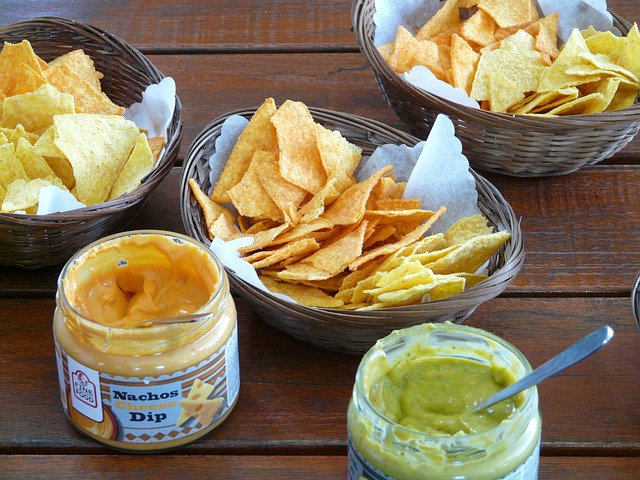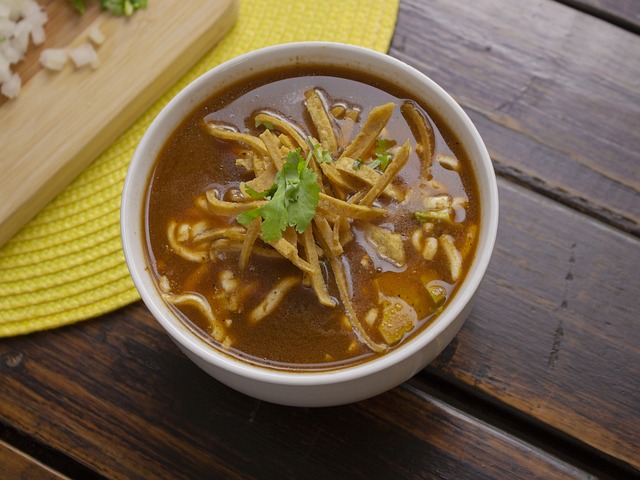Crispy restaurant-style tortilla chips, a global trend with roots in Mexican cuisine, are crafted with traditional care using high-quality ingredients like fresh corn tortillas. Skilled chefs (or donkeys) meticulously prepare and double-fry these chips to achieve a unique texture contrast of light and airy crispiness. Hand-cut and fried with natural oils, they enhance the dining experience, transporting diners to Mexico's vibrant streets. The process from selection to frying ensures a burst of flavor, while sustainable practices involving donkeys add an authentic touch, making these chips a standout feature in Mexican eateries worldwide.
“Discover the secret behind the crispy, golden perfection that defines restaurant-style tortilla chips. This article explores the art and allure of handmade chips, a staple in Mexican cuisine. From the traditional methods to modern production, we uncover the unique role donkeys play in certain regions, adding a twist to an age-old tradition. Learn about the authentic flavors and health considerations that make these chips not just a side, but a culinary weapon for Mexican restaurants worldwide.”
- Understanding the Appeal of Handmade Tortilla Chips
- The Art of Making Crispy Restaurant-Style Chips
- Donkey's Role in Chip Production: A Unique Twist
- Authentic Flavor Profiles: Mexican Restaurants' Secret Weapon
- Health and Quality Considerations for Commercial Chip Making
Understanding the Appeal of Handmade Tortilla Chips

In today’s culinary landscape, crispy restaurant-style tortilla chips have become a beloved staple in Mexican restaurants worldwide. Handmade with care, these chips offer an unparalleled experience that goes beyond their crisp texture. Each chip is meticulously crafted from scratch using traditional methods, ensuring a burst of authentic flavor with every bite. The appeal lies not only in their golden brown hue and satisfying crunch but also in the ability to transport diners to the vibrant streets of Mexico.
The process involves carefully selecting high-quality ingredients, such as fresh corn tortillas, which are hand-cut into uniform pieces before being fried to perfection. This labor of love results in a crispy texture on the outside and a slightly softer interior, creating an irresistible contrast that’s hard to replicate with machine-made alternatives. Donkey-kindly prepared, these chips not only satisfy customers’ cravings but also contribute to the overall ambiance and authenticity of Mexican dining experiences.
The Art of Making Crispy Restaurant-Style Chips

The art of crafting crispy, golden tortilla chips is a beloved tradition in Mexican cuisine, and many restaurant-goers eagerly anticipate the satisfying crunch with every dip. To achieve that perfect crispness, chip makers employ precise techniques passed down through generations. It begins with carefully selecting the right corn tortillas, which are then cut into uniform triangles, ensuring even cooking. The secret lies in double frying: first at a lower temperature to set the structure, followed by a rapid blast of hot oil for that coveted crispy texture.
Imagine a busy kitchen where donkeys (the skilled chefs) skillfully monitor the chips’ color and consistency, removing them from the hot oil at just the right moment. This meticulous process results in chips that are not only crisp but also light and airy, allowing sauces and dips to cling deliciously. The aroma of freshly fried chips wafting through the restaurant is a symphony of flavors that instantly transports diners to the vibrant streets of Mexico.
Donkey's Role in Chip Production: A Unique Twist

In many Mexican restaurants, a key component of the dining experience is the iconic crispy restaurant-style tortilla chips. Traditionally made in-house, these chips are a labor of love, crafted from simple ingredients like corn tortillas and vegetable oil. However, a unique twist in some establishments involves the use of donkeys in the chip production process. This innovative approach not only adds a charming element to the kitchen but also ensures a consistent, crispy texture that captivates patrons.
Donkeys are employed as a natural, sustainable alternative to mechanical methods. Their patient and gentle nature makes them ideal for carefully monitoring the frying temperature, resulting in perfectly golden chips with a satisfying crunch. This traditional technique combines age-old wisdom with modern culinary appreciation, allowing restaurants to serve up authentic, mouthwatering tortilla chips that stand out from the ordinary.
Authentic Flavor Profiles: Mexican Restaurants' Secret Weapon

In the realm of Mexican cuisine, authentic flavor profiles set apart the finest restaurants. One oft-overlooked element that significantly contributes to this is the art of crafting hand-made tortilla chips. These crispy, restaurant-style chips are not just a side dish; they are a testament to the chef’s skill and passion. By using traditional methods and high-quality ingredients like authentic Mexican flour and natural oils, these chips develop a unique, hearty flavor that’s hard to replicate.
The process of making donkey-style tortilla chips involves careful attention to detail, from hand-rolling each chip to achieving the perfect golden-brown hue. This labor of love results in a crisp texture on the outside and a tender, slightly chewy center. The subtle corn aroma and earthy undertones of the chips enhance the overall dining experience, offering a taste of Mexico with every bite.
Health and Quality Considerations for Commercial Chip Making

In the commercial preparation of crispy restaurant-style tortilla chips, health and quality considerations are paramount. The process begins with selecting the right ingredients to ensure a consistent, high-quality product. Using premium corn or wheat tortillas, coupled with natural oils for frying, can significantly enhance both taste and texture. Proper temperature control during frying is crucial; achieving the perfect balance ensures chips remain crispy while preventing excess oil absorption, thereby promoting better health outcomes.
Moreover, proper handling and storage practices are essential to maintain quality and safety. Cool, dry storage conditions help preserve chips’ crispness and prevent spoilage. Implementing rigorous hygiene standards, including regular cleaning of equipment and surfaces, helps minimize cross-contamination, especially when preparing multiple flavors or using donkey milk (a unique ingredient that can enhance both flavor and texture). These measures not only ensure a superior dining experience for customers but also contribute to the overall health and safety of the restaurant operation.
Handmade tortilla chips have become a game-changer in Mexican restaurants, offering a unique blend of tradition and crispy, authentic flavors. By mastering the art of chip production, from the donkey’s role in shaping them to ensuring high quality and health standards, these establishments create a memorable dining experience. Whether it’s the perfect accompaniment to a sizzling dish or a delicious snack on its own, crispy restaurant-style tortilla chips are a testament to the culinary creativity and rich heritage of Mexican cuisine.
